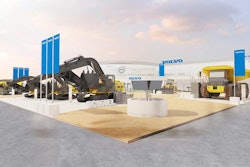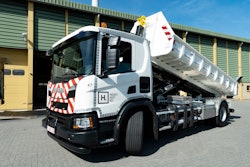In celebration of Hydrogen and Fuel Cell Day, the Energy Department announces a memorandum of understanding (MOU) with the U.S. Army to collaborate in the development of hydrogen and fuel cell technologies for military and civilian use. Signed by the Director of the U.S. Department of Army’s Tank & Automotive Research Development and Engineering Command (TARDEC), Dr. Paul Rogers, and the Director of the Department of Energy’s Fuel Cell Technologies Office, Dr. Sunita Satyapal, the MOU will enable the two research organizations to work more closely on technologies that can meet both organizations’ goals. The signing of the MOU took place at the Association of the United States Army’s Annual Meeting and Exposition held at the Walter E. Washington Convention Center in Washington, D.C. Aptly named for the atomic weight of hydrogen (1.008), Hydrogen and Fuel Cell Day celebrates hydrogen and fuel cell activities throughout the country.
Army TARDEC is the United States Armed Forces' research and development facility for advanced technology in ground systems. Research is underway at Army TARDEC to develop fuel cell powered vehicles for tactical uses, among other activities.
The Energy Department’s Fuel Cell Technologies Office (FCTO), within the Office of Energy Efficiency and Renewable Energy, focuses on advancing an innovative portfolio of hydrogen and fuel cell technologies through early-stage applied research and development (R&D) of technologies. This R&D includes hydrogen production from diverse domestic resources including renewable, fossil, and nuclear resources, infrastructure development including hydrogen delivery and storage, and fuel cells for transportation, stationary, and mobile applications. Through the H2@Scale initiative, the FCTO brings together stakeholders to advance affordable hydrogen utilization to increase revenue opportunities in multiple energy sectors. These activities support the Energy Department’s goals to enable energy security, resiliency, and a strong domestic economy.



















